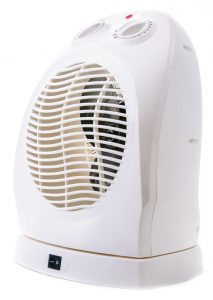
ENERGY ADVISOR
Small space heaters are meant to do exactly as their name says: heat a small space. But unfortunately, many people use portable space heaters to heat their entire home, which can really take a toll on your energy bills. The truth is, whether you should use space heaters really depends on your home’s efficiency and energy needs.
If you’re using a space heater to compensate for problems in your home, like inadequate insulation, drafty windows and exterior doors, or an inefficient heating system, space heaters are not a practical solution. Your best bet is to improve the overall efficiency of your home. If you’re on a tight budget, caulking and weather stripping around windows and exterior doors is a low-cost, easy way to save energy. Depending on the size of your home, adding insulation can be a great next step. Loose fill insulation typically costs $1 to $1.50 per square foot. Taking these proactive energy-saving measures rather than relying on space heaters for supplemental warmth can reduce your heating and cooling bills for years to come.

Perhaps your home is energy efficient but you’re cold-natured and want a specific room to be cozier than the rest. In this case, a space heater may work for your needs. A good comparison is ceiling fans; we use ceiling fans in the summer to cool people, not rooms. A space heater can be used in a similar way during winter months. Only use a space heater in small spaces that you’re occupying and, if possible, try to shut off other rooms to contain the warmth provided by the space heater. If you decide to use a space heater to heat a small area in your home, make sure the heater is properly sized for the space; most heaters include a general sizing table.
A word about safety: the U.S. Consumer Product Safety Commission estimates more than 25,000 residential fires are associated with the use of space heaters every year, resulting in more than 300 deaths. If you must use a space heater, purchase a newer model that includes the most current safety features and make sure it carries the Underwriter’s Laboratory (UL) label. Choose a thermostatically controlled heater to avoid energy waste and overheating, and place the heater on a level surface away from foot traffic when in use. Always keep children and pets away from space heaters.
Consider alternative ways to stay warm like extra layers of clothing or UL-approved electric blankets. If you have hardwood or tile floors, lay down area rugs to provide additional insulation (and appeal!) and maintain warmth.
We know it’s cold out there, but remember in addition to safety concerns, space heaters can greatly increase your energy bills if used improperly.
If you’re looking for alternative ways to save energy and increase comfort in your home, contact Harrison REMC at 812-738-4115. We’re here to help you manage your energy use.



